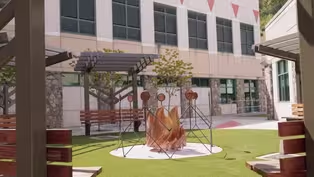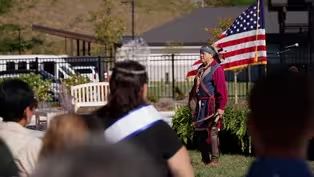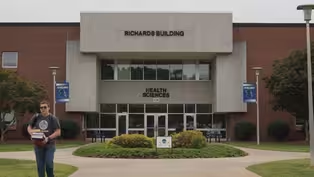
Why Dentists Are Disappearing from Small Towns
Clip: 2/14/2025 | 8m 6sVideo has Closed Captions
The rural dental crisis inspires unlikely solutions.
Rural Americans face a silent epidemic of dental decay, with fewer teeth and more cavities on average than urban residents. In Eastern NC, five counties lack practicing dentists altogether. This story is about the cracks in rural healthcare, an old Zumba studio, and the surprising ways people are fighting back.
Problems playing video? | Closed Captioning Feedback
Problems playing video? | Closed Captioning Feedback
ncIMPACT is a local public television program presented by PBS NC

Why Dentists Are Disappearing from Small Towns
Clip: 2/14/2025 | 8m 6sVideo has Closed Captions
Rural Americans face a silent epidemic of dental decay, with fewer teeth and more cavities on average than urban residents. In Eastern NC, five counties lack practicing dentists altogether. This story is about the cracks in rural healthcare, an old Zumba studio, and the surprising ways people are fighting back.
Problems playing video? | Closed Captioning Feedback
How to Watch ncIMPACT
ncIMPACT is available to stream on pbs.org and the free PBS App, available on iPhone, Apple TV, Android TV, Android smartphones, Amazon Fire TV, Amazon Fire Tablet, Roku, Samsung Smart TV, and Vizio.
Providing Support for PBS.org
Learn Moreabout PBS online sponsorship- 58 million Americans have little to no access to a dentist.
It's an epidemic that's costing us billions and leaving millions in pain.
And those Americans don't live here, here, or here, but in rural small towns across the country, North Carolina alone has five counties that don't have a single practicing dentist.
The solution seems simple, right?
Just get more dental school graduates to move to rural communities.
But how do you get a student who just racked up massive student loan debt to move to a community that's smaller than their graduating class?
Now I know what you're thinking.
You'd probably rather go to the dentist than listen to someone talk about the dentist for the next few minutes.
But this story is about the cracks in rural healthcare an old Zumba studio, and the surprising ways people are fighting back.
I'm David Hurst.
This is "ncIMPACT."
[laid-back jazz music] Tucked away in the Coastal Plains, Hyde County serves as a gateway to North Carolina's famed Outer Banks.
The county seat is Swan Quarter.
And like many things in small town America, there used to be a practicing dentist, but they left decades ago.
- And there's been nothing since that point.
And that would've been in the early '80s.
- So where's the closest dentist from here?
- There's a dentist, Dr. David Elliott, in Belhaven, which is 25 miles west.
- So what do most people do for dental care?
Do they go to him or what do they do?
- Well, people who live in Hyde County are very used to have having to travel great distances for many things.
So people travel to Dr. Elliott in Belhaven.
They go to Washington.
We have people that will travel to Greenville, North Carolina.
People who will travel to the Outer Banks.
But then we also have several people who don't have the option, I guess.
They don't travel, so therefore they don't get the dental care that they need.
- When they then have a dental emergency, what do they do?
- I suspect that they go to an emergency department.
- Suddenly hospitals are juggling dental emergencies that a routine cleaning could have prevented.
And the dental shortage is just one symptom of a larger rural healthcare crisis where communities are losing not just dentists, but primary care doctors and even entire hospitals.
I'm told behind this post office in an old Zumba studio is the secret to solving the problem.
The Hyde County Outreach Clinic operates once a month.
It's run by East Carolina University's School of Dental Medicine.
Melony Grace Hodges is an ECU graduate who grew up in Hyde County.
She's one of the clinic student leaders.
So what got you interested in dental work?
- Well, I had already known that I was interested in the medical field, but I wasn't really sure what I wanted to do.
But I also knew that I wanted to come back home.
And so I came to ECU and I actually heard about this clinic, and so I contacted the previous clinic coordinator and I asked her if I could come in and shadow and just kind of see what's going on.
And once I saw my first dental procedure done, I was like, "Okay, this is cool.
This is definitely something I want to do."
And knowing that there's no permanent dentist here, I knew this is a way that I could help impact my community.
- [Staff] That is for a.
- The clinic sees about 20 patients a month.
One of those patients here for her six-month checkup is Cynthia Fisher.
What did you do for dental care before this clinic?
- I went to a commercial dentist in Dare County.
- So how long of a drive was that?
- About an hour.
- And how inconvenient was that two-hour round trip?
- Ah, okay.
To get to Dare County, one way is an hour to get there.
So then the hour to get my teeth cleaned normally.
So that's two hours, then an hour to go back to work.
So that was a three-hour journey.
- So that's pretty much half your day right there.
- Half my day.
- [David] Now Fisher and others can get their teeth cleaned during their lunch break.
But as nice as that is, providing care one day a month is not enough to treat all patients or issues that require multiple visits.
So ECU partnered with the county health department to set up teledentistry.
It allows ECU faculty to diagnose oral health problems from miles away.
- And so the nurse at the health department has this.
And if they have an emergency come in, and we're not here, they can call us and do the same kind of consultation and show us what's in the patient's mouth so we can say, "Hey, they need to come in right now 'cause it's a bad infection, or we'll schedule 'em when we come out here next month."
And it works really well.
- How long have you all been using it?
Has it kind of taken off during Covid?
- That's a great point.
Yes.
We were using it long before.
In fact, the first time I personally used this was in 1994 in the Army, and we did it from remote areas, almost identical setup.
But Covid really caused us to use it a lot.
- Sometimes it takes a pandemic to try something new, but let's face it, teledentistry can't fix everything.
You can't get a root canal over Zoom.
At the end of the day, we need to make rural areas more attractive to dentists.
But setting up shop in a small town is a tough sell when it's not really financially sustainable.
You see in rural communities, a high percentage of residents rely on Medicaid.
In Hyde County, it's about one in four people.
Relying on Medicaid creates a financial squeeze for dentists.
In North Carolina, reimbursement rates have been frozen for 15 years, while everything else from equipment to staff wages keeps getting more expensive.
Why do you think it's so challenging to get dentists to come to a community like this?
- Well, we're just about as rural as you're gonna find in North Carolina.
We don't have Walmarts, we don't have Food Lions, and we're a poor county, we're a tier one county.
So anybody that does come here isn't going to likely make the money that they would in a metropolitan area.
- But here's where things get interesting.
The ECU dental school isn't just providing pop-up clinics, they're training future rural healthcare heroes.
Here's how it works: Fourth year dental students go through a unique rotation program.
They spend 27 weeks living and working in what's called community service learning centers.
These centers are located in rural and underserved areas.
As part of the program, students can volunteer at the Hyde County Outreach Clinic.
This experience often inspires graduates to establish practices in underserved communities.
- But the fact that now all of our students, for the last two years, every single student that's come through East Carolina University has worked in this clinic and met the people of Hyde County and seen the impact that we're having here and they're having here.
So not only learning clinical dentistry, but learning how important it is to develop trust within your team and within the community.
And hopefully they fall in love with this type of work and this community, and they want to come out, whether it's in Hyde County, or the county they're from, they want to go out and make a difference in rural America.
- And one future success story could be right here in Hyde County.
Melony Grace Hodges says she wants to return to her hometown to open a practice after graduating.
And when you think about your future, I mean, you could probably go and practice somewhere in Raleigh or Charlotte and make a whole lot more money, but what is it about coming back here to this hometown and serving your community?
- Yeah, I would have to say it's the people.
I mean, the amount of support that I've received, I don't know how I could go off to Raleigh without coming back and helping them.
They've all helped me so much.
And like I said, Hyde County isn't just the residents, it's like a family here.
And so that's why I would love to come back.
- [David] Hodges' story is inspiring, but in order for her to succeed, it likely requires a perfect storm of solutions.
This could include updated Medicaid dental reimbursement rates, more dental schools stepping up to fill workforce needs, and other passionate graduates like Hodges committed to making a difference.
For "ncIMPACT," I'm David Hurst.
How The Cherokee Are Disrupting Healthcare
Video has Closed Captions
Clip: 2/14/2025 | 7m 16s | Native American response to healthcare crisis offers lessons for better health outcomes nationwide. (7m 16s)
Video has Closed Captions
Preview: 2/14/2025 | 30s | In health care deserts, rural community members are pioneering new ways to care for their own. (30s)
Why the Nursing Shortage Hasn’t Recovered From COVID
Video has Closed Captions
Clip: 2/14/2025 | 6m 37s | North Carolina's nursing shortage crisis drives search for innovative healthcare staffing solutions. (6m 37s)
Providing Support for PBS.org
Learn Moreabout PBS online sponsorship
- News and Public Affairs

Top journalists deliver compelling original analysis of the hour's headlines.

- News and Public Affairs

FRONTLINE is investigative journalism that questions, explains and changes our world.












Support for PBS provided by:
ncIMPACT is a local public television program presented by PBS NC


